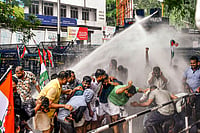The National Green Tribunal (NGT) has directed the Manipur government to pay Rs 200 crore as environmental compensation for improper management of solid and liquid waste. A bench headed by chairperson Justice Adarsh Kumar Goel said remedial action cannot wait for an indefinite period, nor loose-ended timelines without accountability can be a solution.
It said the responsibility of the state is to have a comprehensive time-bound plan with tied-up resources to control pollution. The bench, also comprising Justice Sudhir Agarwal and expert member A Senthil Vel, said it is high time the state realised its duty to the law and to citizens and adopts further monitoring at its own level.
“Compliance of environmental norms on the subject of waste management has to be on high on priority,” the bench said. The tribunal said the first change required is to set up a centralised single window mechanism for planning, capacity building and monitoring of waste management at the state level.
It should be headed by an officer of the rank of Additional Chief Secretary with representation from the departments of Urban Development, Rural Development, Environment and Forest, Agriculture, Water Resources, Fisheries and Industries, the tribunal said.
Fixing accountability of the state authorities for the gap in sewage generation and treatment along with the gap in solid waste management, the tribunal said: “We levy compensation of Rs 200 crores on the state on the polluter pays principle for its failure in scientifically managing the liquid and solid waste…”
The amount may be kept in a ring-fenced account to be operated as per directions of the Chief Secretary, the tribunal added. The funds available for solid waste management can be utilised for setting up solid waste processing facilities, remediation of legacy waste and setting up of sewage treatment plants (STPs) and Faecal Sludge Treatment Plant (FSSTPs), the green panel said.
“Moreover, there are better alternatives to utilise the wet waste for composting at appropriate locations and the scale of expenditure for STPs may be reviewed in the light of realistic expenses involved in decentralised or traditional systems,” it added.The NGT also directed six monthly progress reports with verifiable progress to be filed by the Chief Secretary before it.
(With PTI inputs)


























